Global high-mix volume high-speed PCBA manufacturer
9:00 -18:00, Mon. - Fri. (GMT+8)
9:00 -12:00, Sat. (GMT+8)
(Except Chinese public holidays)
Global high-mix volume high-speed PCBA manufacturer
9:00 -18:00, Mon. - Fri. (GMT+8)
9:00 -12:00, Sat. (GMT+8)
(Except Chinese public holidays)
HomePage > Blog > Knowledge Base > Computer Circuit Boards: A Comprehensive Guide
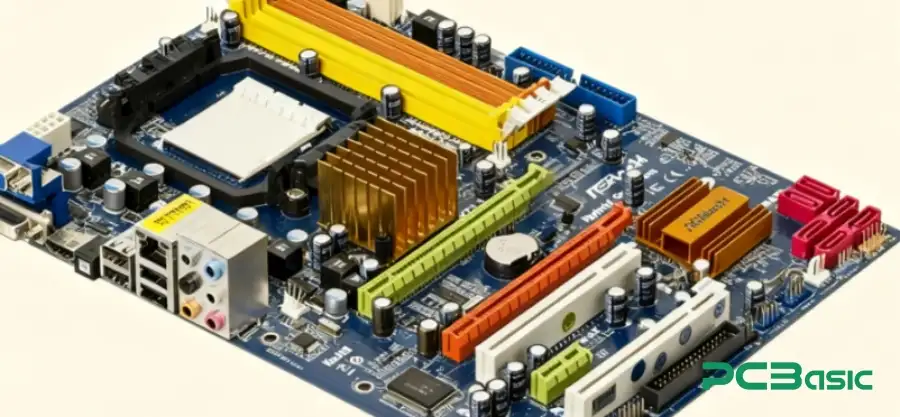
The unknown hero of contemporary computing is a computer circuit board. In its absence, processors, memory, and storage would only be pieces of scattered components without means of communication. The computer printed circuit board provides the base on which communication, power distribution, and physical support are provided. Indeed, the computer motherboard, or the primary circuit board, is what determines the identity of the machine.
This article shall discuss in this guide the development of computer circuit boards, their importance, their construction, the components, their various types, and their purpose in manufacturing. Furthermore, there shall also be discussions about how a computer circuit board works, how to make a computer circuit board, and answer the basic question: what is the main circuit board of a computer?
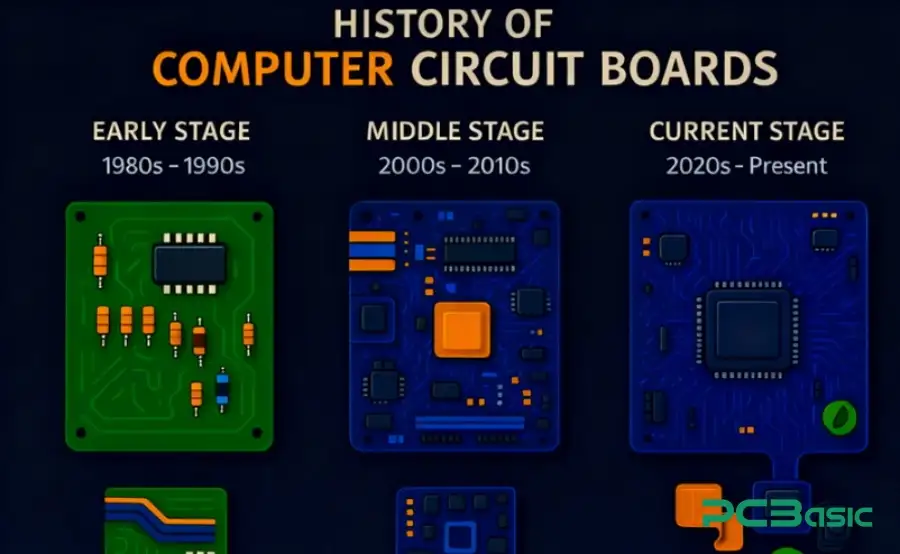
During the 1980s, PCs were introduced as domestic appliances. Initial designs of circuit boards used in the PC were quite simple. They were single or double-sided boards of limited routing on traces. As an example, a 1981 IBM PC had a basic computer board to hook its Intel 8088 CPU, RAM sockets, and expansion slots.
At this period, assembly of PC boards was mainly manual. The prevailing technology was through-hole, where the component with long leads had to be soldered into holes that had been drilled. This was a method of making the PCB elements large, but also capable of providing stable connections to comparatively low-speed circuits.
As processors arrived at the gigahertz speed, there was a need to modify the PC circuit board design. Multilayer PCBs have become standard. Engineers were then able to allocate the power and ground planes to specific layers. This aids in maintaining signal integrity. Surface mount technology was used on many boards, which allowed the boards to have much smaller components.
The motherboard in a computer has become highly integrated. In the early days of PCs, these cards were separate devices. For example, graphics, networking, and sound each required its own card. As technology advanced, everyone saw manufacturers embedding many of these functions on the PC board as standard.
The computer circuit board is a marvel of engineering. A single motherboard of computer systems may have more than 10 layers. Further, it supports multiple CPUs, terabytes of memory, and other high-speed PCIe connections for GPUs. The routing density of the PCB board can be increased by using microvias and fine traces, which are HDI (High-Density Interconnect) techniques.
Moreover, green initiatives made manufacturers reduce the use of hazardous materials. Foldable laptops and wearable device products are possible today thanks to flexible and rigid-flex boards. These are a new definition of PCB board.
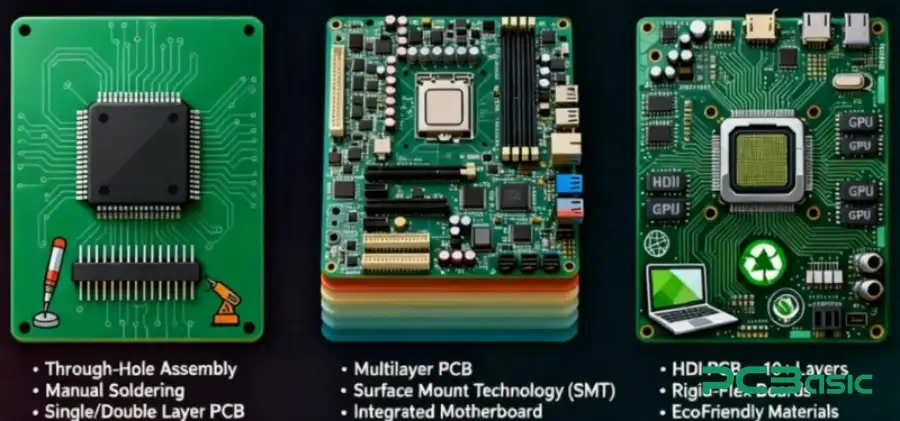
· Miniaturization: Denser layout board due to smaller transistors.
· Design: Signal integrity, impedance control, and EMC dominate PC board assembly considerations.
· Flexible materials: A wide range of flexible materials is used for smartphones, smartwatches, and medical devices.
· Sustainability: No lead used for soldering; laminates can be recycled.
The computer circuit board is a platform that enables a CPU to talk to memory, a GPU to render graphics, and storage devices to supply data. The computer would just be a bunch of parts without this software platform.
· The copper traces in a PC circuit board facilitate the transmission of millions of electrical signals every second.
· This power distribution allows for the correct voltages to get to the chips on the PC board so that those chips are prevented from experiencing voltage surges.
· The components of various computer boards hold the entire computer together in one structure.
Smartphones: A small PCB that coordinates the communication of cameras and touchscreens
Servers: A server is a fast-processing computer that links computers in a network.
Consumer Electronics: Even a smart refrigerator is powerless without a PC circuit board for the display and controlling the motor.
A board is made of non-conductive material, which is usually fiberglass (FR-4), along which traces are usually copper conductors through which the electrical signals flow. It is the basis of electrical and electronic gadgets.
· Power circuits supply energy to electrical devices, while electronic circuits are designed to regulate and manipulate electronic signals.
· Closed circuits let the current flow, and open circuits obstruct the current. A short circuit creates unwanted pathways.
· Parallel: same voltage, split current; Series: same current, split voltage.
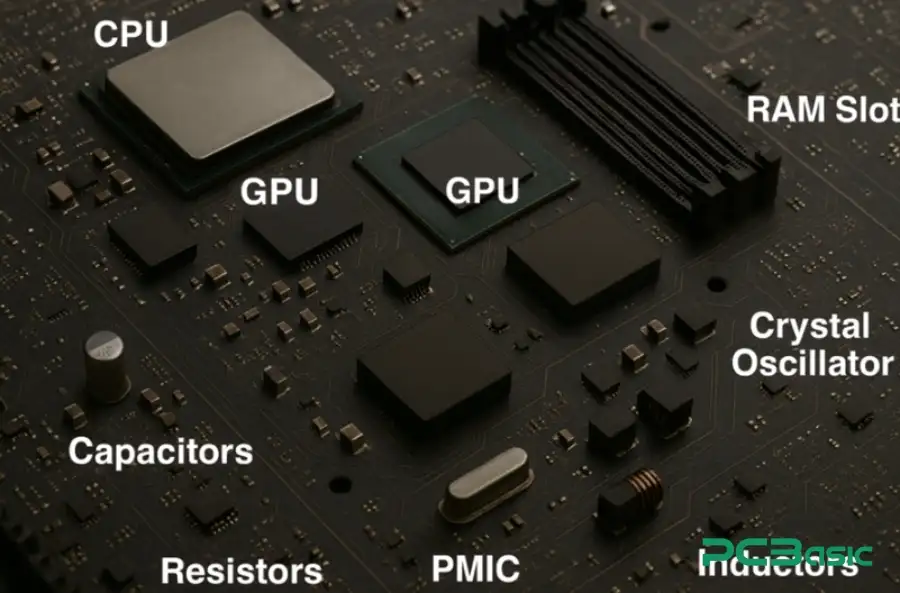
· Transistors are billions of switches that form logic gates, amplifiers, and processors.
· Diodes allow current to flow only in one direction.
· Resistor: Slows down the flow of current.
· Capacitors: Capacitors are there to temporarily store energy and to stabilize voltages while also filtering the dust from signals.
· Inductors: Inductors help regulate the flow of current in power supplies. They also filter high-frequency signals.
Every computer’s microprocessor is basically a microprocessor IC with billions of transistors. Other ICs manage memory, communication, and graphics. The most complex computer board parts are very complicated.
Every computer board has connectors for USB peripherals, SATA hard disks, HDMI video, and PCIe for expansion cards.
These days, engineers use CAD software to model PC board components and test signal flow before making them. By doing this, a company can avoid pricey PC board assembly mistakes.
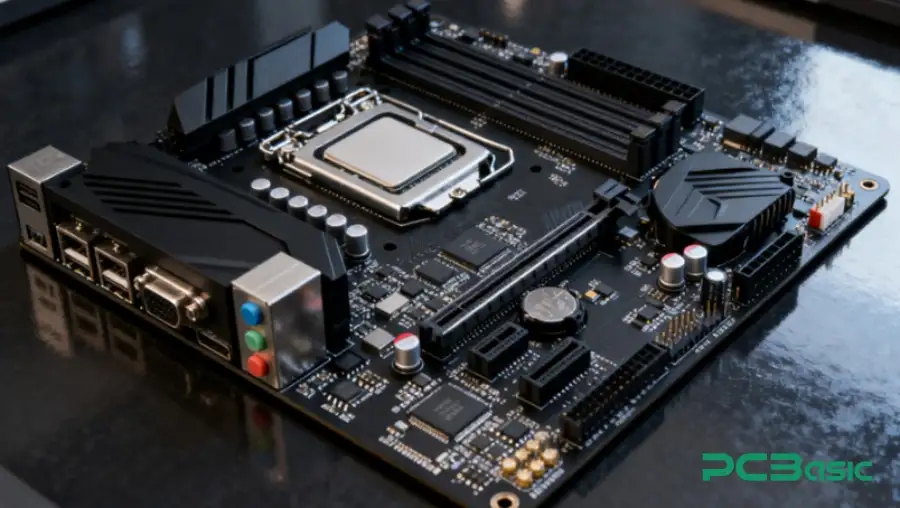
Copper traces are placed on one side of a Computer Circuit Board design or layout; such a design is a single-sided Computer circuit board design. It is an inexpensive and simple computer circuit board. Mainly found in cheap electronics like calculators, LED modules, and power supplies. In early computing, keyboards and basic peripheral boards often relied on single-sided designs.
A double-sided PCB has copper layers on both sides of the board, which are connected by vias. The use of this allows for more complex routing and more components on PC boards. They will be found all over mid-level devices. These include power supplies, some interface boards, and certain computer control circuits.
Modern computing typically utilizes multilayer printed circuit boards (PCBs) with from 4 to over 20 layers. Different layers can be used for power, ground, and high-speed signals to avoid interference and save space. For the motherboard, the main circuit board of any computer is always a multilayer one.
Rigid PCBs are fabricated with the help of fiberglass substrates. Due to their secured holding of CPU, RAM, and expansion slots, and flexibility of not bending, they dominate in desktops, laptops, and servers.
Flex computer circuit boards or flex PCBs can be bent, folded, and shaped, and are made from polyimide and other flexible materials. They will be found in mobile phones, tablets, and wearables, where space is tight. They are ideal for small electronic designs because of their adaptability.
Rigid-flex PCBs integrate stiff and bendable sections into one layer. It minimizes the requirement of connectors and cables, enhancing reliability. They are likely in aircraft materials, medical devices, and thin laptops.
To accommodate gigahertz-level signals, PTFE and other special substrates are used in high-frequency PCBs. Wi-Fi routers, server boards, and communication devices need them to maintain precise impedance control due to high data speeds.
An aluminum-backed PCB has a metal base for heat dissipation. In computers, they are mainly used in power supplies and graphics systems. Here, the PC board components generate heat that would be significant.
|
Type |
Features |
Applications |
|
Single-Sided PCBs |
Copper traces only on one side, low cost, simple design |
Calculators, LED modules, power supplies, early keyboards and peripherals |
|
Double-Sided PCBs |
Copper layers on both sides connected by vias, supports more complex routing |
Mid-level devices, power supplies, interface boards, control circuits |
|
Multilayer PCBs |
4–20+ layers, dedicated power/ground/high-speed signal layers, reduces interference |
Motherboards, server boards, modern computer systems |
|
Rigid PCBs |
Fiberglass substrate, non-bendable, strong support for CPU, RAM, expansion slots |
Desktops, laptops, servers |
|
Flex PCBs |
Polyimide or flexible materials, can bend and fold, adaptable to tight spaces |
Mobile phones, tablets, wearable devices |
|
Rigid-Flex PCBs |
Combines rigid and flexible sections, fewer connectors/cables, higher reliability |
Medical devices, aerospace, ultra-thin laptops |
|
High-Frequency PCBs |
PTFE and special substrates, GHz-level signals, precise impedance control |
Wi-Fi routers, server boards, communication equipment |
|
Aluminum-Backed PCBs |
Metal base for heat dissipation, handles significant heat |
Power supplies, graphics systems |
The motherboard of computer systems is the central hub. It connects the CPU, RAM, storage, and peripherals. While other computer circuit boards can only do one thing, such as the graphics card, the motherboard combines them all.
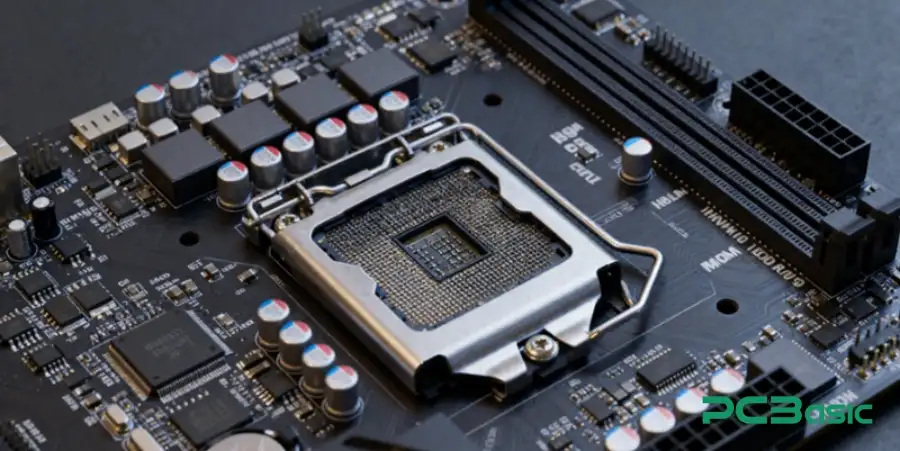
· CPU Socket: Firmly holds a processor.
· Memory Slots: Are the connections for RAM.
· Chipsets (Northbridge/Southbridge): Control communication between CPU, RAM, and peripherals.
· SATA and PCIe Interfaces: used for storage devices and graphics cards.
· The CMOS battery: powers the real-time clock and preserves BIOS/UEFI settings.
· Power supply connector: Delivers power to the whole board.
· Ports: USB, HDMI, Ethernet, and audio ports.
When someone asks, What is the main circuit board of a computer, the answer is always: the motherboard.
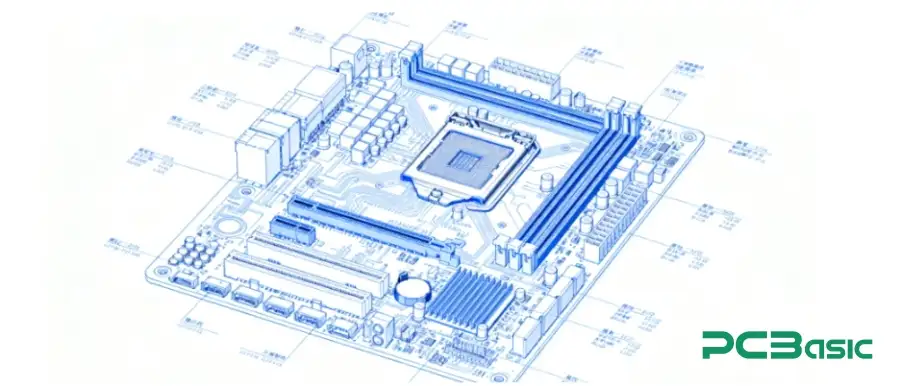
· Engineers use CAD software to lay out circuits.
· The integrity of signals, impedance, and thermal management is analyzed.
· Prototypes are tested before full PC board assembly.
· Surface-Mount Technology (SMT) places small components directly on pads.
· THT Offers a Strong Mechanical Connection
· Reflow Soldering heats the board to melt solder paste for surface mounting.
· THT parts get soldered by passing the component board over molten solder.
· Inspection and testing validate a product's performance by using AOI, X-ray, and functional testing.
Assembly of a high-quality PC board requires precision equipment and certifications. Companies like PCBasic offer complete services from design to testing, so that each computer circuit board meets international standards.
Over the years, the computer circuit board has changed a lot. In the 1980s, a simple single-sided board was being used. Today's computer is no longer simple like that. Today's computer has a high-density multilayer motherboard. It is the platform that defines how a computer works.
This article answers how to make a computer circuit board, looks into how the computer circuit board works, and explains what a computer motherboard is. The motherboard is referred to as the main circuit board inside the computer. This is the essential component of the computer that allows the digital technology to function. The PC circuit board will have AI design, green components, and flexible materials in the future. The computing innovation of the next decades will still depend on the computer board, no matter the changes.
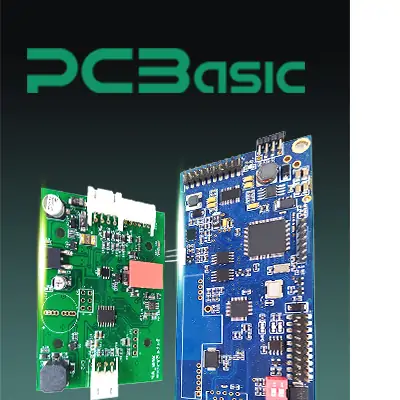 About PCBasic
About PCBasic
Time is money in your projects – and PCBasic gets it. PCBasic is a PCB assembly company that delivers fast, flawless results every time. Our comprehensive PCB assembly services include expert engineering support at every step, ensuring top quality in every board. As a leading PCB assembly manufacturer, we provide a one-stop solution that streamlines your supply chain. Partner with our advanced PCB prototype factory for quick turnarounds and superior results you can trust.
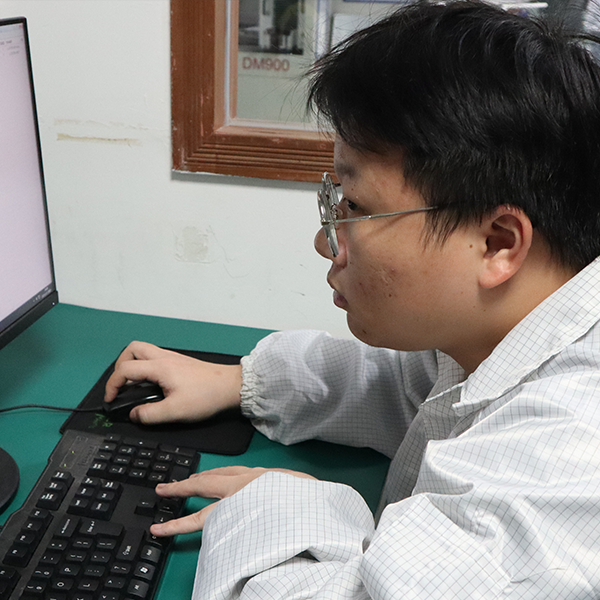
Assembly Enquiry
Instant Quote
Phone contact

+86-755-27218592
In addition, we've prepared a Help Center. We recommend checking it before reaching out, as your question and its answer may already be clearly explained there.
Wechat Support

In addition, we've prepared a Help Center. We recommend checking it before reaching out, as your question and its answer may already be clearly explained there.
WhatsApp Support

In addition, we've prepared a Help Center. We recommend checking it before reaching out, as your question and its answer may already be clearly explained there.
